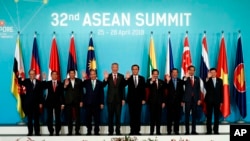The Association of Southeast Asian Nations (Asean) remains an important trading partner for the United States, but more should be done to ensure US companies can access Southeast Asian markets, officials said.
“When we look at the Asean countries, we see tremendous opportunity to deepen our trade ties, enhance economic and job growth and expand US exports,” Deputy US trade representative Jeffrey Gerrish told a gathering of US businessmen, and US and ASEAN diplomats in Washington last month.
“We have an interest in ensuring that Asean while deepening its own integration through the ASEAN economic community continues to be a free, fair, and open destination to export and do business.”
Trade between the US and Asean was $234 billion in 2016 and the US exported goods and services worth over $100 billion to Asean, according to the websites of the US-Asean Business Council and the Office of the US Trade Representative.
President Donald Trump has addressed trade balances with its partners and is working to improve them, officials said.
“The United States does a lot for Asean in terms of market access,” said Gerrish. “We need Asean to do more for us.”
Gerrish said that some of the issues that need to be addressed between the US and Asean are new, while some are long-standing.
“Whether they relate to agricultural imports in Thailand or vehicle barriers in Vietnam, localization requirements in Indonesia or a merchant barrier to electronic payment services in several countries,” he said. “We will work with our Asean partners to address and resolve these issues successfully and to our mutual benefit.”
Asean, which consists of Brunei, Burma, Cambodia, Indonesia, Laos, Malaysia, Philippines, Singapore, Thailand, and Vietnam, represents a market with a gross domestic product of more than $2.4 trillion and a population of 632 million people. The region is the United States’ fourth-largest trading partner after China, Canada, and Mexico.
“I believe that Asean as a block is well-poised to be the success story of our generation,” said Congressman Joaquin Castro (D. TX). “The region’s dynamic and young population of 650 million, its innovative economy that approaches 3 trillion, and the region’s critical location at the nexus of critical trade routes equip the region well for success. The United States must support and be a part of this success story.”
Asean is a region of different markets, varying economic developments, and diverse politics and cultures. Some of its members, such as the Philippines, Vietnam, and Cambodia, have troubling human rights records.
Congressman Castro reiterated the US commitment to human rights as well as economic development.
“We cannot be silent on the issue of human rights and I’ve spoken up very publicly,” Castro told VOA Khmer. “As a co-chair of the US-Asean Caucus, I want to help develop and strengthen the relationship within the Congress for the Asean nations, but we also need to speak up and call them out when they violate human rights,”
Meanwhile, China is expanding its sphere of influence economically and politically in Asean.
“This is good for everybody,” said Chum Bunrong, Cambodian Ambassador to the US. “Once we have more investors and there is competition, it’s good for Cambodia and for them as well. If they see us as a good partner, they will not let us fall to others unless we don’t welcome them. We welcome everybody and those who come later will receive the remaining benefit.”
The Trump administration has also pulled the US out of the Trans-Pacific Partnership Agreement.
“We at the US-Asean Business Council believe in free and fair trade and the TPP, now called CPTPP, is a great trade agreement and we hope the US will consider going back and find a way to join the other 11 countries,” said Alexander Feldman, president, and CEO of the US-Asean Business Council. “The President, himself, has made a reference to the fact that it’s no longer off the table and we certainly welcome other bilateral agreements.”







